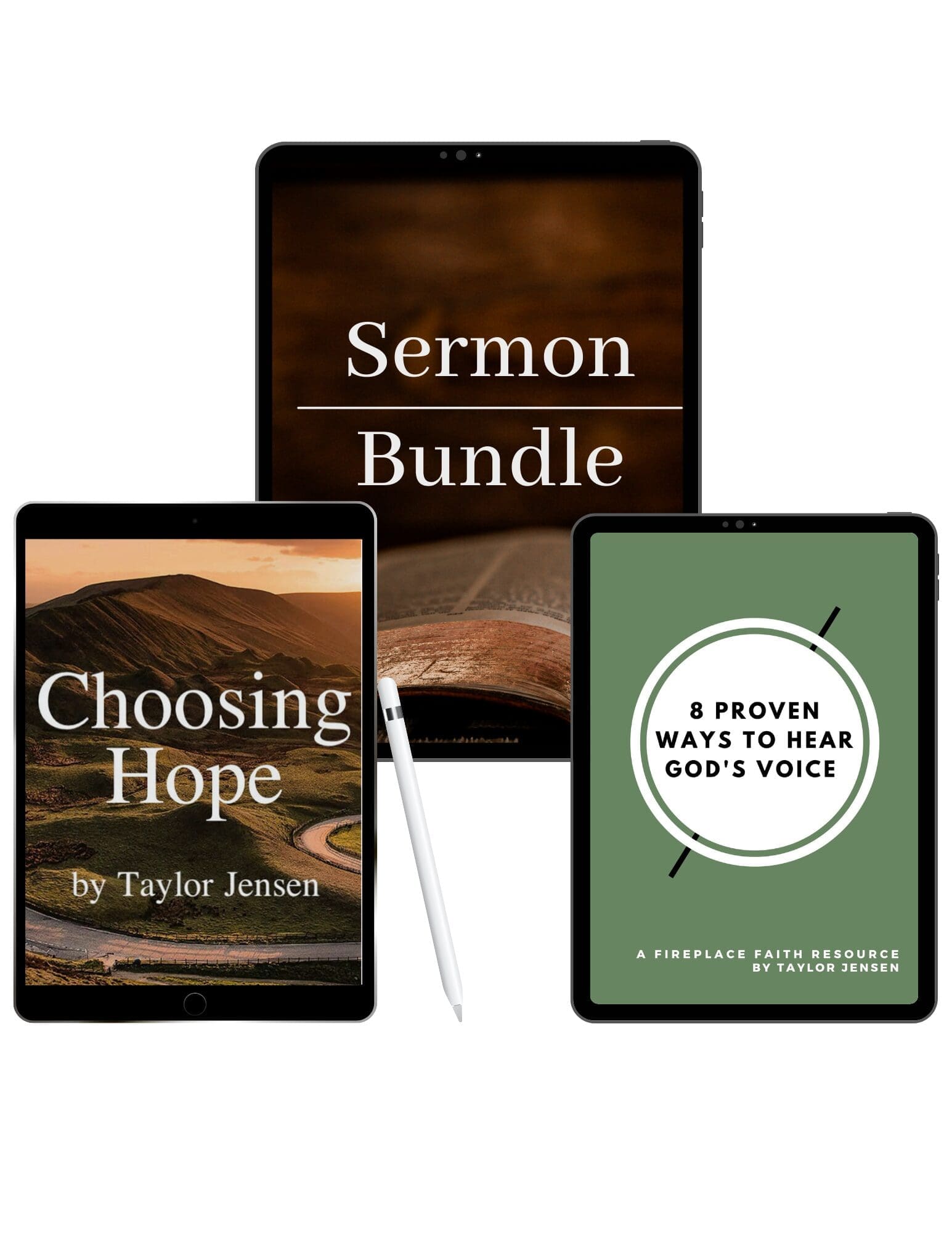You know you should “hope in the Lord,” but to be honest, you have no idea what that means. You are trying to feel hopeful, but let’s face it, that is hard. So you go to church and hear people say, “Put your hope in God,” and that if you hope, you will, “Renew your strength and soar on wings like eagles!”
Plans? Eagles? What does this have to do with you feeling hopeful about your life? And practically, even if you did feel hopeful, how does a feeling get you out of this circumstance?
In this post, we will dive deep into what it means to hope in the Lord and how hope can be the very thing to transform your life.
I believe hope is one of the most important things in a believer’s life. That is why, for those who want to study hope even deeper, I wrote Choosing Hope, a deep dive Bible Study on hope. Get the book, 10 of my most popular sermons, and a short ebook on hearing God’s voice in my FREE RESOURCES BUNDLE. Get that FREE Resource Bundle Here.
1. Hope is a Rope.
Theodore Roosevelt once said,
“When you’re at the end of your rope, tie a knot and hold on.”
That’s good advice.
I don’t know about you, but I grew up believing that hope is a feeling. But this is far from Biblical truth.

In this verse, the Hebrew word we translate as “hope” is “tiqvah.” One of its definitions is “hope,” but when this word, “tiqvah,” first appears in the Bible for in Joshua 2:18, it has another translation: “a rope.”
Yes, a literal rope.
So another way to read Jeremiah 29:11 is “For I know the plans I have for you,’ declares the LORD, ‘plans to prosper you and not to harm you, plans to give you A ROPE (tiqvah) and a future.'”
This means that God has plans to prosper us, and knowing this truth ties us, ropes us, anchors us to our future. Hope is not a feeling but a rope held by our God.
Hope isn’t a feeling but a choice to hold on to what the Bible says is true. Hope is the lifeline rope that we hold on to when we are stuck in the pit of despair.
We can’t see out of the pit, but God will lift us out if we hold on to the truth. So, whether we feel it or not, we proclaim this truth — that God has a good plan for our lives, regardless of the moment’s circumstances.
What Do You Put Your Hope in? That is Your Rope.
So how do you know if you have put your hope in God or something else? By looking at what you have tied yourself to in life as your primary security source. How do you react when the rope gets cut to that source? That reveals how much hope you placed in that versus in God.
Let me explain more. If my security is tied to anything in this world — my job, house, health, money, political party, economy, whatever — then I have secured my hope to this world rather than to God.
Then, when I lose my job, can’t pay my rent, get sick, lose my money, the wrong person gets in the White House, the economy tanks, a loved one dies, I will lose all hope for this life!
This is why God says, do not hope in money, people, politics, or your abilities, because all of it could fail and falter.
True hope is when we tie ourselves to God as our primary security source. It is ok to have money, a house, friendships, and deep relationships as a gift in your life. The issue is when they control you and your hope.
God says His plans are supposed to be our rope to our future. Nothing else!
2. Hope is an Eager Expectation.
The ancient Hebrew word hope in this famous verse is the word, “qavah”. It means hope, but a more accurate translation of this word is “to wait with expectancy. To look for,” and “to lie in wait for.”
Another way to read this verse is, “those who eagerly look for, expect, and lie in wait for the Lord will renew their strength.”
Qavah-type hope is like a bride and groom waiting for their wedding day. They don’t hope maybe one day they will get married. They don’t say, “Maybe one-day people will happen to meet us at the venue. Hopefully, a pastor will be there, and if it’s God’s will, then everything will align, and we will get married.”
No way! They prepare for months for this single day! They choose a venue. They ask the pastor to prepare. They carefully select their bridal party. They count down the time left: “In 152 days, 15 hours and 3 minutes, we will get married.”
There’s nothing passive about it. On the contrary, their waiting is very active, preparative, and pregnant, with growing expectations for that day. Qavah hope is a pregnant mom who doesn’t wait for the baby to come passively but prepares for their arrival actively.
Often we don’t feel like the Lord will come into our situation, but we must still prepare as though he is coming. So we do everything to get ready for the big moment when we know that we know that God will walk down the aisle and save us.
Qavah hope is like a child who hides from dad coming around the corner. This child is lying in wait, ready to jump out and scare him the second he appears.
This is what the word hope means. We eagerly lie in wait for God to come around the corner! We do not wait half asleep, but rather on full alert, looking for the slightest move of God, ready to jump out the second we see him!
Those kinds of people with that attitude will find renewed strength and soar! Because even though a storm is around them, they know that God is on the move, and like the child waiting for dad, they are so excited to see how God will breakthrough!
Hope is never a victim; it is always the victor. Hope always expects
Enjoying this Post? Get New Content like this sent directly to you!
3. Hope is the Act of Binding.
This Hebrew word, “qavah” has yet another definition in the Bible: “to bind and gather.” This word is used to describe the binding of a string around branches or to fasten items together.
When families go hunting for Christmas trees every year, that is the first meaning of qavah. They are eagerly looking for a tree. But when they find it and then bind it to the roof of their car to make sure that it doesn’t go flying off on the highway, that is what this second meaning of qavah is.
Hope does not wait to see if God’s plan for the tree is to balance it on the car the entire drive home. Hope does not think “if it’s meant to be, then the tree will survive the drive home.”
Hope is an act of binding.
To hope in God means to bind God’s promises to yourself. Hope intentionally wraps His words and truth around your heart, mind, and life.
We must choose, even when it is painful, to surround and bind every wound and tragedy, not with the questions of “Why did this happen? How could God let this happen to me?” but instead with what we know about God’s love, redemption, and provision.
Often we do not have hope because we do not choose hope. But our Bible says that God redeems all things. We must bind this truth and the other truths found in scripture to our hearts. That is what hoping in God looks like!
For the Christian, it is more realistic to believe God will heal a situation than to think He will not. His word says He is a Healer. That is the truth we bind to ourselves.
It is incredibly naive to look at the eternal, all-powerful, all-knowing, all-controlling God of the universe and expect darkness to win. The true wisdom of Heaven says God always wins. True discernment says that God is in control. Therefore, choosing hope is always the wisest option possible because it is the only option grounded in God.
So what is hope? A rope we cling to, an eager expectation we have, and the action of binding God’s truth to our lives. How do we “hope in God?” By searching for God in our lives, reading and declaring his scripture over our lives, and choosing to live with the absolute assurance that God is able and will show up!



This is a very good explanation of biblical hope. I have bookmarked it and would like to visit it frequently to get it in my mind as I continue to pray. The part about “binding” was a little challenging to grasp. Does this mean to keep focusing on His Good promises and the truth about ourselves until one day He decides to give us the gift of hope? I can’t make that happen but I can be dutiful to keep memorizing verses, praying, reading and attending church…while I wait for Him to change my mind and heart.
Jennifer, sorry no one has replied to this question. While I am no expert in the matter, I do believe that “binding” is choosing to memorize, meditate, and focus on both the promises of God as well as the Promiser who is faithful and true. Hope will not simply happen in our life, but we can choose to position ourselves through faith in a position where hope can grow and flourish. Continue to do exactly what you said you were doing the last sentence. God is faithful and true. That is who He is. So, yes, we eagerly wait for Him to change our minds and hearts as we stay in a position of humility and faithfulness. It reminds me of one of the shortest prayers in the Bible…”I believe. Help my unbelief.” Press on, sister!!!
Exactly Eric!! That is so good! Binding is the intentional choosing of diving into everything Eric just said. Thank you Eric for the amazing response!